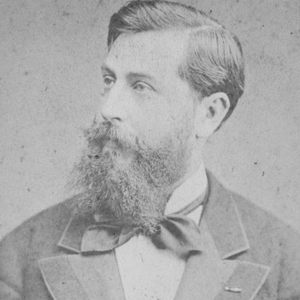Clément Philibert Léo Delibes (21 February 1836 – 16 January 1891) was a French composer of the Romantic era (1815–1910), who specialised in ballets, operas, and other works for the stage. His most notable works include the ballets Coppélia (1870) and Sylvia (1876), as well as the operas Le roi l’a dit (1873) and Lakmé (1883).
Delibes was born in Saint-Germain-du-Val, now part of La Flèche (Sarthe), France, in 1836; his father was a mailman, and his mother a talented amateur musician. His grandfather had been an opera singer. He was raised mainly by his mother and uncle following his father’s early death. In 1871, at the age of 35, the composer married Léontine Estelle Denain. His brother Michel Delibes migrated to Spain; he was the grandfather of Spanish writer Miguel Delibes.
Starting in 1847, Delibes studied composition at the Paris Conservatoire as a student of Adolphe Adam. A year later he began taking voice lessons, though he would end up a much better organ player than singer. He held positions as a rehearsal accompanist and chorus master at the Théâtre Lyrique, as second chorus master at the Paris Opéra (in 1864), and as organist at Saint-Pierre-de-Chaillot (1865–71). The first of his many operettas was Deux sous de charbon, ou Le suicide de Bigorneau (“Two sous-worth of coal”), written in 1856 for the Folies-Nouvelles.
A ceremonial cantata, Algers, for Napoleon III on the theme of Algiers, brought him to official attention; a collaboration with Ludwig Minkus resulted, in which Delibes composed music jointly for the ballet La source (1866), which brought him into the milieu of ballet. In 1867 Delibes composed the divertissement Le jardin animé for a revival of the Joseph Mazilier/Adolphe Adam ballet Le corsaire. He wrote a mass, his Messe brève, and composed operettas almost yearly and occasional music for the theater, such as dances and antique airs for the 1882 revival of Victor Hugo’s Le roi s’amuse, the play that Verdi had turned into Rigoletto.
In 1870 Delibes gained notoriety with the success of his ballet Coppélia; its title referred to a mechanical dancing doll that distracts a village swain from his beloved and appears to come to life. His other ballet is Sylvia (1876).
Never in robust health, Delibes died little more than a month before his 55th birthday. He was buried in the Cimetière de Montmartre in Paris.
Delibes was made a Chevalier de la Legion d’honneur in 1877.
It has been suggested that Delibes also wrote the ballet music for Gounod’s Faust, which had been inserted ten years after the original performance of the opera.
Of Delibes’s various operas, the last and most important was the lush orientalizing Lakmé (1883), which contains the famous coloratura showpiece known as the Légende du Paria or Bell Song (“Où va la jeune Indoue?”) and The Flower Duet (“Sous le dôme épais”), a barcarolle that Patricia Rozema made famous in her film “I’ve Heard the Mermaids Singing” and later used by British Airways commercials. At the time, his operas impressed Tchaikovsky enough for the composer to rate Delibes more highly than Brahms—although this may seem faint praise when one considers that the Russian composer considered Brahms “a giftless bastard.”
His work is known to have been a great influence on composers such as Saint-Saëns, Debussy, Drigo and Tchaikovsky. His ballet Sylvia was of special interest to Tchaikovsky, who wrote of Delibes’ score: “… what charm, what wealth of melody! It brought me to shame, for had I known of this music, I would have never written Swan Lake.”


10 thoughts on “Kaminos”
Was Nicholas related to Alexander Saslavsky who married Celeste Izolee Todd?
Anyone have a contact email for Yair Klinger or link to score for Ha-Bayta?
wish to have homeland concert video played on the big screen throughout North America.
can organize here in Santa Barbara California.
contacts for this needed and any ideas or suggestions welcomed.
Nat farber is my great grandpa 😊
Are there any movies or photos of max kletter? His wife’s sister was my stepmother, so I’m interested in seeing them and sharing them with his wife’s daughter.
The article says Sheb recorded his last song just 4 days before he died, but does not tell us the name of it. I be curious what it was. I’d like to hear it.
Would anyone happen to know where I can find a copy of the sheet music for a Gil Aldema Choral (SATB) arrangement for Naomi Shemer’s “Sheleg Al Iri”. (Snow on my Village)?
Joseph Smith
Kol Ram Community Choir, NYC
שלום שמעון!
לא שכחתי אותך. עזבתי את ישראל בפברואר 1998 כדי להביא את בני האוטיסט לקבל את העזרה המקצועית שלא הייתה קיימת אז בישראל. זה סיפור מאוד עצוב וטרגי, אבל אני הייתי היחיד עם ביצים שהביא אותו והייתי הורה יחיד בשבילו במשך חמישה חודשים. הוא היה אז בן 9. כעת הוא בן 36 ומתפקד באופן עצמאי. נתתי לו הזדמנות לעתיד נורמלי. בטח, אבות כולם חרא, אומרים הפמינציות, אבל כולם צריכים לעבוד כמטרות במטווחי רובה!
משה קונג
(Maurice King)
Thank you for this wonderful remembrance of Herman Zalis. My late father, Henry Wahrman, was one of his students. Note the correct spelling of his name for future reference. Thank you again for sharing this.
Tirza Wahrman (Mitlak)
amazing zchuso yagein aleinu, he wrote the famous niggun Lefichuch that is sung in almost every Israeli Yeshiva